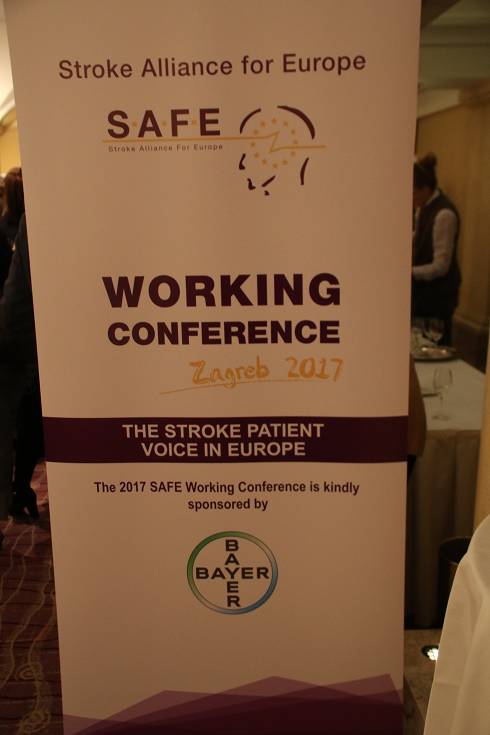
Dec 13, 2017
After a highly competitive tendering process, SAFE is proud to announce their partnership with The Foundry Healthcare, a division of Foundry Communications Limited. The Foundry were successfully awarded the contract to develop SAFE’s new and exciting e-learning tool to help strengthen the advocacy capacities of our member organisations.
“This was one of those projects that had the whole agency talking. Everybody understood both the political and emotional motivators behind SSOFT and worked really hard to deliver a proposal that would meet the needs of its users. We are delighted to be working with SAFE to raise awareness of stroke and support all those affected “. Ian McKay, Digital Director and Founder
“The Foundry Healthcare delivered a passionate and professional response to our brief, demonstrating they had the experience and skills to deliver against our primary objectives, which is enabling stroke survivors and their supporters to campaign for greater awareness and better care, and to build stroke support organisations” Jon Barrick Board President of SAFE. (more…)
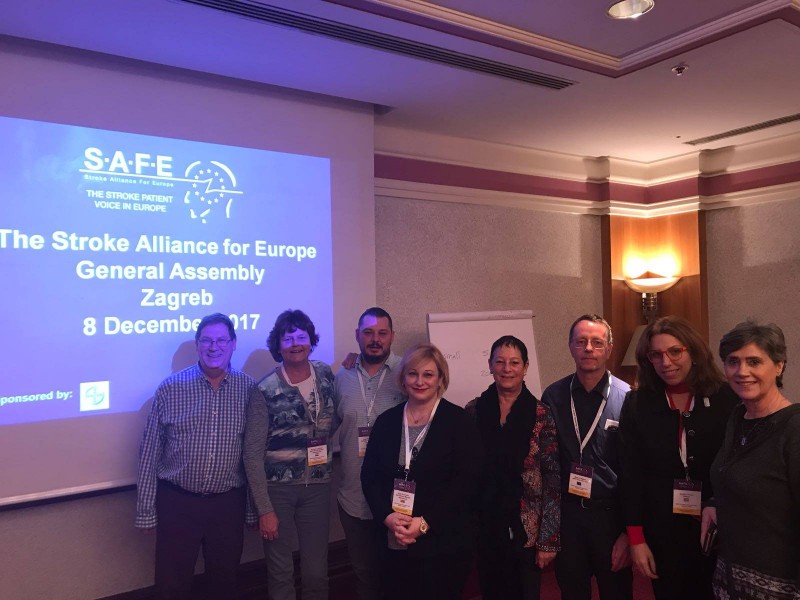
Dec 10, 2017
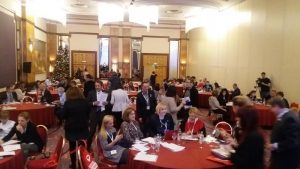 The Working Conference and General Assembly of the Stroke Alliance for Europe (SAFE) took place at the Westin Hotel, Zagreb from 6-8th December, 2017. This was the most successful SAFE annual conference to date, with around one hundred delegates from more than 30 European countries.
The Working Conference and General Assembly of the Stroke Alliance for Europe (SAFE) took place at the Westin Hotel, Zagreb from 6-8th December, 2017. This was the most successful SAFE annual conference to date, with around one hundred delegates from more than 30 European countries.
SAFE delegates have approved at the General Assembly two new applications for membership that have been previously approved by the board. These are from the Irish Heart Foundation and Beyinder Turkey.
A stroke support organisation Sdružení pro rehabilitaci osob po cévní mozkové příhodě (Czech Republic) have been reinstatement as a SAFE member.
France AVC did not comply with membership requirements during the 2017 and therefore did not become a full member until now. At this General Assembly, they have submitted the missing documents and the delegates confirmed their membership. (more…)
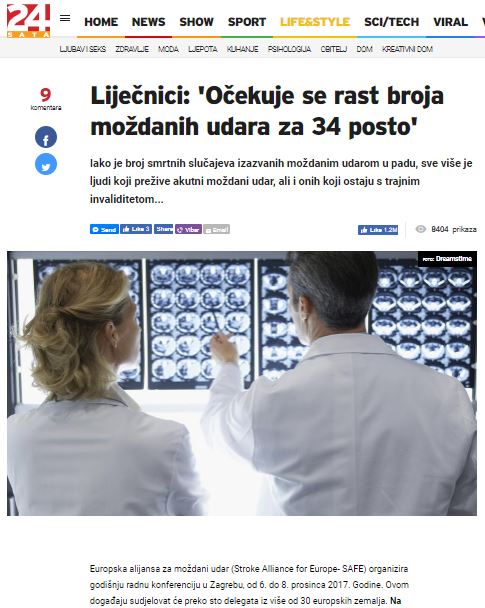
Dec 4, 2017
Please read below an excerpt from an article published in Croatian online portal www.24sata.hr about the SAFE Working Conference 2017.
Although the number of deaths caused by stroke is in decline, there are more people who survive an acute stroke, but there are also others who remain with a permanent disability…
Stroke Alliance for Europe (SAFE) is organising an Annual Working Conference in Zagreb, Croatia, from 6-8th December 2017. There will be more then 100 delegates from over 30 European countries. The Working Conference will cover topics such as current and future projects aiming to reduce the number of new strokes in Europe and enable better life for stroke survivors and their families with the consequences of this disease.
SAFE started a project called „Stroke Support Organisation Faculty Tool- SSOFT“. At the moment, the focus is on building an online platform for education of stroke support organisations and individuals about stroke and how to advocate for improvement of the prevention, treatment and post-stroke care.
In 2017, SAFE has finished a big project “Burden of Stroke in Europe”, in which Croatia took an active part.
Please read the whole article here.

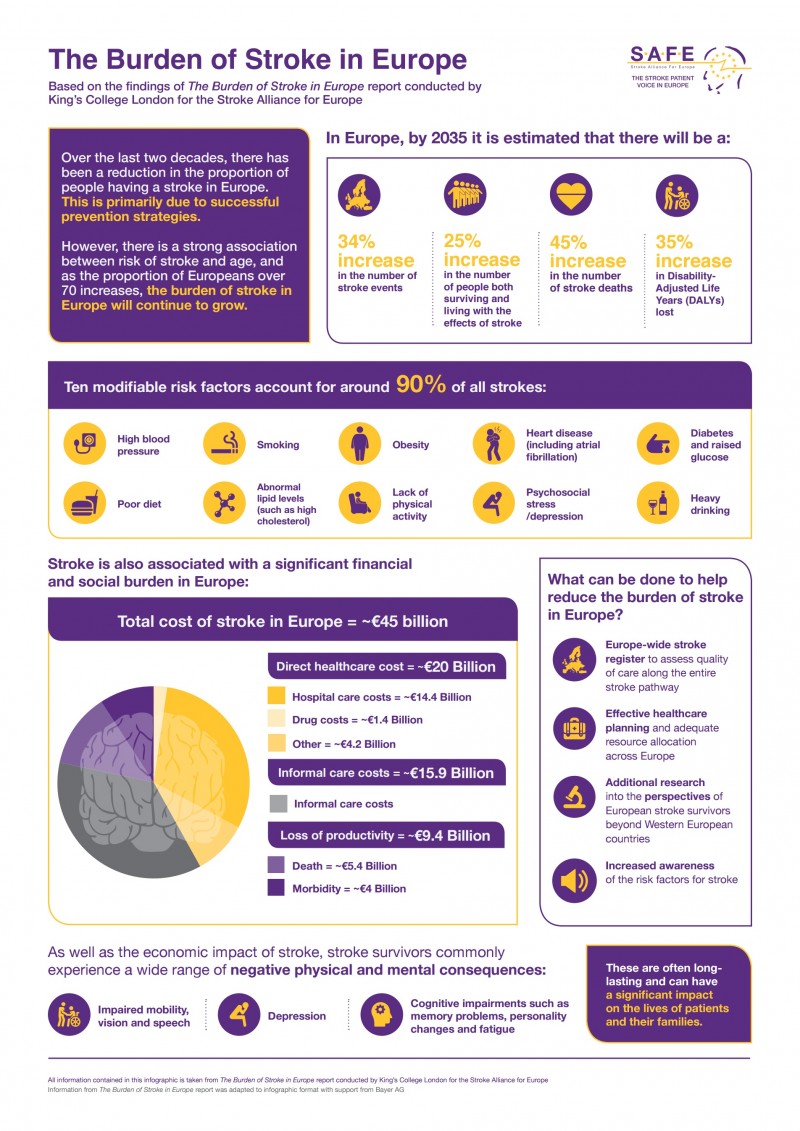
Dec 1, 2017
With grateful thanks for its generosity to our industry partner Bayer, we are now presenting you with infographics based on the data from the Burden of Stroke Report, in SAFE branding, showing data country by country.
Please find your country infographic below these two general infographics, showing the size of the burden and the state of the stroke treatment across Europe.


You can open and download any specific infographic by clicking on the name of the country from the list below.
Austria
Belgium
Bulgaria
Croatia
Cyprus
Czech Republic
Denmark
Estonia
Finland
France
Germany
Greece
Hungary
Iceland
Ireland
Israel
Italy
Latvia
Lithuania
Luxembourg
Macedonia
Malta
Netherlands
Norway
Poland
Portugal
Romania
Serbia
Slovakia
Slovenia
Spain
Sweden
UK
Ukraine

Nov 29, 2017
All countries face the challenge of funding ever-new and expensive treatments, with increasing pressure on budgets, harmful deficit spending, and ever-higher health insurance premiums. One solution to these concerns is to scale back on outdated or low-value procedures; not unlike clearing out one’s clothing closet to make room for more contemporary wear.
Yet there is little understanding of “exnovation,” or the scaling-back of expensive medical treatments for certain medical practices. To better understand this process, researchers at The Dartmouth Institute for Health Policy and Clinical Practice studied nearly 10,000 physicians who performed carotid revascularization — a surgical procedure used to reduce the risk of stroke by correcting narrowing in the carotid artery — on elderly Medicare patients between 2006-2013. Its use is increasingly controversial, particularly among older patients and for those who aren’t exhibiting symptoms of carotid artery narrowing. (more…)



 The Working Conference and General Assembly of the Stroke Alliance for Europe (SAFE) took place at the Westin Hotel, Zagreb from 6-8th December, 2017. This was the most successful SAFE annual conference to date, with around one hundred delegates from more than 30 European countries.
The Working Conference and General Assembly of the Stroke Alliance for Europe (SAFE) took place at the Westin Hotel, Zagreb from 6-8th December, 2017. This was the most successful SAFE annual conference to date, with around one hundred delegates from more than 30 European countries.






